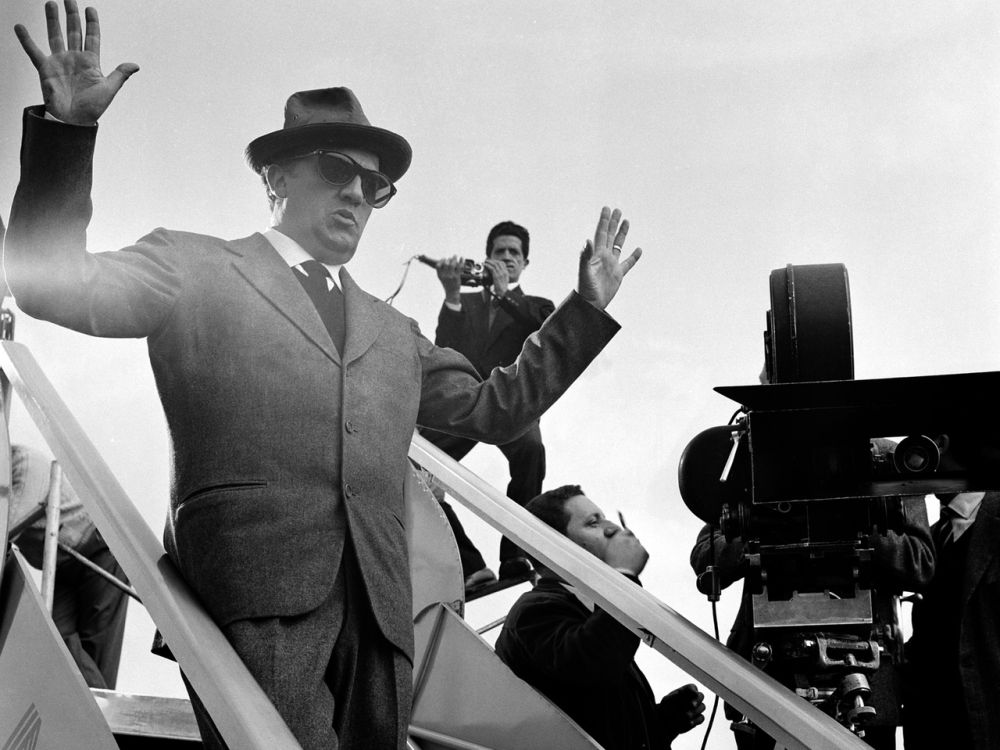Caparezza, Fellini, inconscio, o Della scelta
(cosa esplora “Fellini e l’ombra” di Catherine McGilvray ora al cinema)
Il documentario “Fellini e l’ombra” ci permette di riprende in mano e approfondire alcuni aspetti di Federico Fellini già accennati
“Tendere l’orecchio e il cuore a qualcosa che è quasi dimenticato e che non vorrei aver dimenticato” racconta la voce di Fellini. Ecco, ritroviamo già in questa frase la cifra del cinema di Fellini: la purezza dei personaggi di La strada o di Cabiria, la difficoltà di amare del Casanova, l’impossibile bellezza di Sylvia, de La dolce vita, lo strano rapporto con la memoria in Amarcord e la crisi del regista di Otto 1/2.
“I tuoi spiriti dicono sei libero, ma devi saper scegliere” dicono al protagonista di Otto 1/2. La “scelta” sembra ossessionare continuamente Fellini, anche le sue ultime due opere incompiute, il Mastorna e Tulum esasperano ancora di più la difficoltà “concludere”, che troviamo in ogni suo lavoro. Tanto è vero che scrive al produttore Dino: ” questa storia mi sembra una serie di entrate in cui non riesco a entrare”.
Come scegliere? Scegliere significa sciogliere un dubbio, de-cidere (tagliare), dare un significato. Caparezza nel suo ultimo disco dice di ispirarsi al Mastorna e al Guido sopra citati. Nel brano La scelta racconta la storia di due personaggi, che compiono scelte opposte, ma entrambe valide in quanto meditate e accettate. In fondo il momento della scelta è solo un’illusione.”Saresti capace di scegliere una cosa sola e farla diventare la tua ragione di vita?” chiede Guido a Claudia. Ebbene la cosa è in realtà impossibile.
Quando scegliamo infatti escludiamo e paradossalmente impediamo il presentarsi del dubbio (infatti lo sciogliamo) e quindi impediamo il presentarsi della necessità della scelta che però ci ha portato a compierla! Bel paradosso, ma è così che si costituisce il Tempo secondo Bergson e Deleuze. In Differenza e ripetizione lo scrive chiaramente: “il presente costituisce il tempo, ma è il passato puro a garantire il passare del presente”.
Ed è lo stesso Deleuze, nel capitolo sulle immagini-tempo cristallo, a esprimersi come farà Fellini nella lettera a Dino: “Il problema non è più sapere ciò che esce, e come, dal cristallo, ma al contrario, come entrarvi. Si riconosce il metodo che via via apparterrà a Fellini”. E si perché è un “cominciamento”, “quello che si vede nel cristallo è lo zampillio della vita, il tempo nel proprio sdoppiamento”, e in Fellini assistiamo a germi di cristallo. “Il presente che passa e va verso la morte, il passato che si conserva e trattiene il germe di vita, non cessano d’interferire, di intersecarsi”
The medulla, on the other hand, is the inner region that contains fewer lymphocytes as well as more macrophages, specialized cells that swallow up tonerin gyogyszer ára and also ruin international substances.


